
The continued increase in electricity rates every year, the government’s limited-time subsidies on solar and the adverse impact of climate change have propelled Indians to switch to solar.
Solar panel adoption significantly increased in the first 9 months of 2023, and ever since, rooftop solar installations have surpassed 3 GW, according to reports, marking a 58% growth from 2022. The same report also revealed that India’s total renewable energy capacity reached 133.88 GW by the end of 2023.
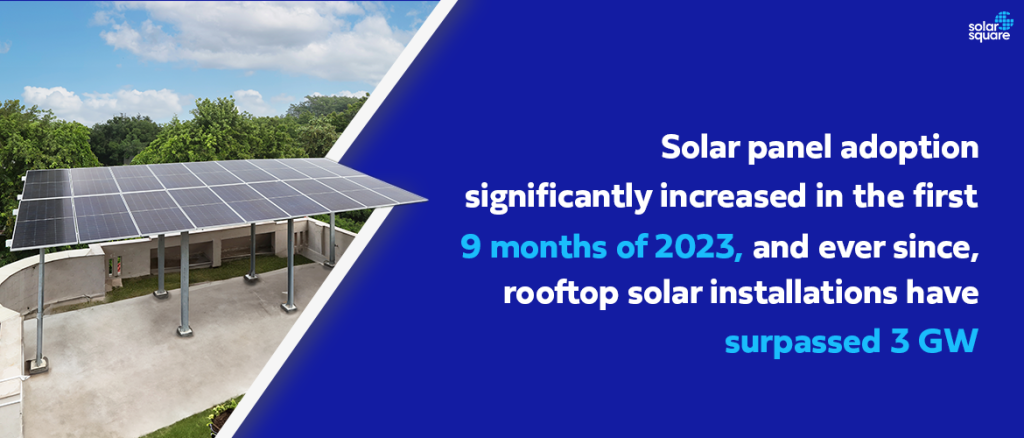
The PM Surya Ghar Muft Bijli Yojana has been a key motivator for many homeowners to consider solar installations to save significantly on electricity bills.
In the Interim Budget 2024-25, Finance Minister Nirmala Sitharaman announced enhancements to the scheme, further accelerating India’s move towards a solar-powered future. The government now offers subsidies of up to Rs. 108,000 in Uttar Pradesh and Rs. 78,000 for all other states for residential solar plants, making solar energy more accessible and affordable for millions across India.
While the government aims to enable 1 crore households to receive up to 300 units of free electricity monthly through the PM Surya Ghar Muft Bijli Yojana, misinformation is rampant among the public, obscuring the reality of implementation and eligibility criteria.
- Overcommitted savings: Some vendors claim your electricity bill will drop to zero immediately after installation.
- Fake promises: Vendors guarantee that their solar panels will last 50 years without any degradation, which is an overstatement.
- Non-engineered mounting structures: Some vendors offer a generic solar panel system without considering the three primary factors – your annual electricity consumption, sanctioned load, and rooftop space with shadow-free area which leads to suboptimal performance.
- Fly-by-night vendors: Vendors primarily focused on electrical work launch a side business of installing solar panels, without proper engineering knowledge.
While the solar industry is a regulated market, it is an unorganised one. Therefore, when selecting the right solar panel installation vendor, you must consider several crucial points.
Sahi Rooftop Solar with SolarSquare
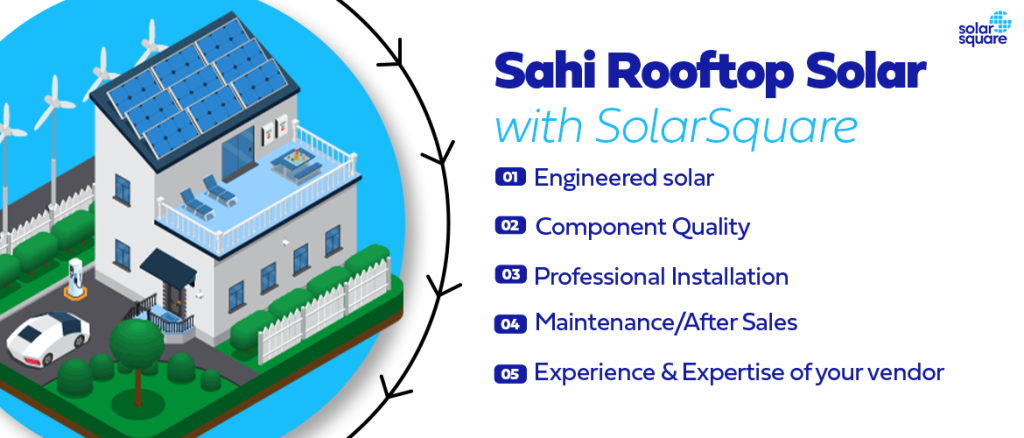
1. Engineered solar
A well-engineered solar system requires a blend of mechanical, electrical, electronics, civil, and design engineering capabilities. The key components that play a crucial role in the system’s efficiency and longevity include the following.
- Shadow Analysis
Nearby trees, telecom towers, or external structures can cast shadows, reducing the effective space for solar panels and impacting the solar system’s performance and lifespan. Placing panels in consistently sunny areas is necessary for maximum power generation and protects your investment.
Thus, before installing solar panels, SolarSquare’s professionals analyse your roof and identify shadow-free zones over 365 days.
Many local installers neglect this factor, focusing only on available space rather than optimal placement. The strategic placement of your solar structure ensures your panels receive optimum sunlight throughout the year.
- Design Engineering
There is no one-size-fits-all solar. Each solar panel system must be customised to meet specific energy needs and environmental conditions. Design engineering involves sizing and selecting components, optimising the layout for sunlight exposure, and providing structural integrity and electrical safety.
SolarSquare’s design engineers consider these factors and integrate the system into your home infrastructure.
Furthermore, mounting structures are the pillars of a good solar panel system. They are the foundation strength ensuring your system does not fly away because of high windspeeds.
Our Intelligent WindPro Mount™ 2.0 is a mounting structure designed to withstand high wind speeds. Supported with tapered C Channels and built with top-tier virgin steel by TATA, Essar, and JSW, our structures ensure both safety and stability. This design is inspired by iconic structures like the Burj Khalifa, Qutub Minar, and the Eiffel Tower.
This level of engineering sophistication is critical for reliable solar installations.
2. Component Quality
Drawing from recent events like the Mumbai sandstorm and Cyclone Biparjoy in 2023, which saw many solar structures being damaged or blown away, our commitment to robust solar solutions is evident.
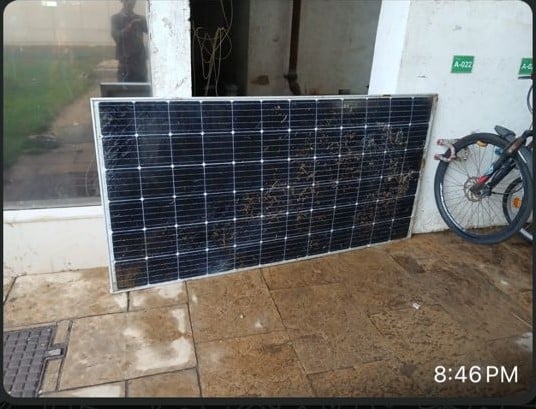
These incidents highlight the necessity for strong solar structures, and our approach prioritises reliability and longevity to withstand such challenges.
Our meticulous handling from factory to onsite involves a comprehensive quality assurance process of solar panel components at every step.
Firstly, at the factory, each component undergoes rigorous quality checks to ensure that it meets our stringent standards for durability and performance. Once the components pass quality control, they are carefully packed and transported in specialised delivery vans designed to keep everything securely in place during transit.
This minimises the risk of damage and ensures that warranties remain intact upon arrival at the installation site.
Additionally, the HILTI Airtight Seal and HDGI Rust-Free Coating reinforce structural integrity and prevent damage, even during severe storms.
3. Professional Installation
Many individuals enter the solar business primarily for profit, lacking the necessary in-depth experience and professional approach.
Experienced installers bring professionalism and reliability to solar installations, adhering to industry standards and prioritising customer safety. Trained engineers possess the technical skills for site assessment, system design, and efficient wiring configurations, ensuring seamless integration of solar technology.
Upon reaching the installation site, SolarSquare’s team of professionals meticulously unpacks and inspects each component again to verify its condition and integrity. Any potential issues or damage are addressed immediately, and replacements are made if necessary.
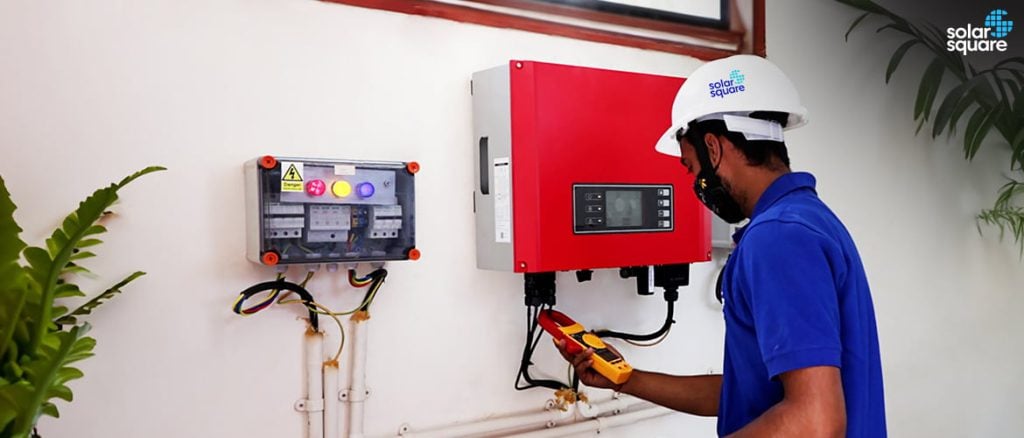
Unlike other vendors that perform on-site welding and assembly, our factory-based assembly process and Japanese Poka-Yoke installation method ensure fool-proof assembly and prevent early rusting. Precision-manufactured components are assembled on-site and tightened to the correct torque, ensuring the durability and reliability of the solar system.
SolarSquare professionals also perform Electroluminescence (EL) Imaging to confirm defects at the factory level, before assembly, unlike any other industry vendor.
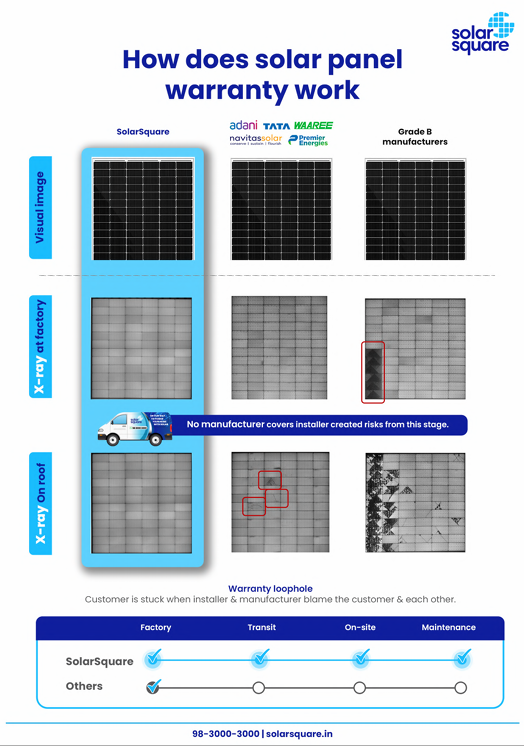
4. Maintenance/After Sales
Maintenance and after-sales service are often overlooked but crucial for optimising solar system performance. While some vendors suggest simple water splashing for maintenance, proper upkeep involves mechanical, electrical, and software inspections, specialised cleaning, and prompt resolution of technical issues by professionals.
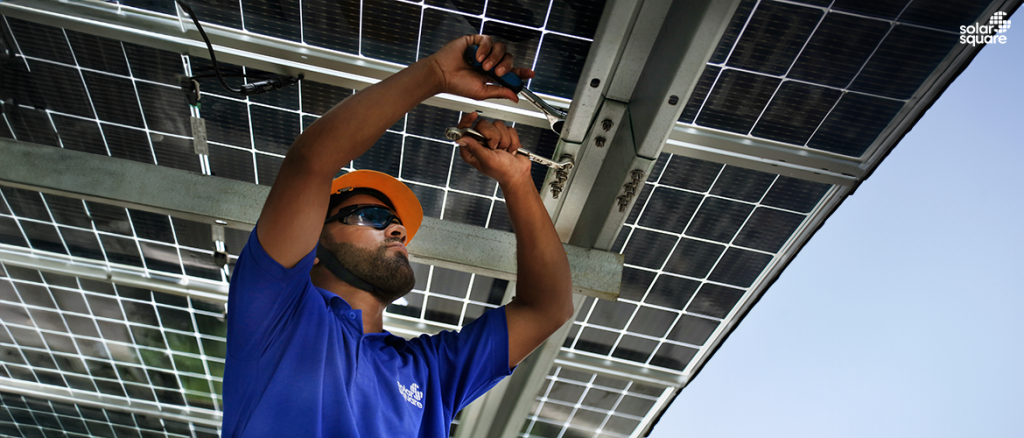
Solarsquare emphasises regular maintenance by trained professionals, tailored to the installed system, with monthly or quarterly schedules.
We perform–
- Preventive Maintenance by a trained technician every 90 days or four times a year.
- Corrective Maintenance which is an on-call break-down service.
- Module deep cleaning, critical for solar system performance, is performed every 15 days or 20 times a year.
Additionally, we offer 5-year free maintenance, ensuring optimal energy production and maximising return on investment. These services adhere to equipment and panel manufacturers’ prescribed norms, safeguarding warranties and ensuring long-term reliability.
- Experience and expertise of your vendor
The reality in the solar industry is that many vendors lack comprehensive knowledge about available systems, technology, and best practices for installation. This deficiency extends to their understanding of engineering principles and the quality of components required for reliable solar installations.
As a result, they may recommend outdated or subpar equipment and installation methods, compromising the effectiveness and longevity of solar systems.
Moreover, inadequate understanding of proper maintenance practices leaves customers vulnerable to issues that could impact the performance and safety of their solar installations.

Without regular maintenance from knowledgeable professionals, solar systems may underperform or even fail prematurely, leading to frustration and loss of trust in solar solutions.
Ultimately, the lack of expertise among some vendors can have detrimental effects on customers’ experiences with solar energy. It highlights the importance of choosing reputable vendors like SolarSquare, who prioritise customer safety and experience, stay updated on industry advancements, and adhere to best practices to deliver high-quality, reliable solar solutions.
What should you do next?
Making informed decisions is crucial when adopting solar energy, and SolarSquare is committed to empowering customers with the guidance and knowledge they need. Beyond just financial savings, solar adoption with SolarSquare offers the benefits of energy independence and environmental sustainability, contributing to a greener future for all.
You need to prioritise quality and reliability, and SolarSquare’s solutions and installers exemplify these values. You can trust in the expertise and dedication to excellence for a successful and sustainable solar journey in the long run.
12,000 families and 130+ housing societies have gone solar with SolarSquare. Take the first step towards a brighter future—book a consultation with SolarSquare today!
